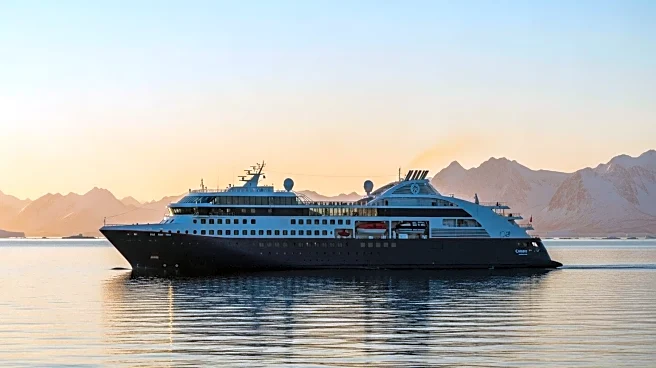What's Happening?
Hurtigruten and Havila Voyages are set to launch climate-neutral sailings along the Norwegian coast, marking a significant step towards reducing emissions in maritime travel. Hurtigruten will operate its vessel Richard With on a 3,100-mile round-trip using 100% biofuel, specifically Hydrotreated Vegetable Oil (HVO100), which is derived from renewable waste materials. This initiative is part of Hurtigruten's €100 million investment in technical and environmental upgrades to its fleet. Havila Voyages plans to use liquified biogas on its LNG-fueled vessel Havila Polaris, significantly reducing greenhouse gas emissions by over 90%. Both companies aim to demonstrate the feasibility of sustainable maritime operations, aligning with Norway's climate goals and regulations requiring zero emissions in its World Heritage fjords.
Why It's Important?
The introduction of climate-neutral sailings by Hurtigruten and Havila Voyages is a pivotal development in the maritime industry, showcasing the potential of biofuels and biogas in reducing emissions. This move supports Norway's aggressive push towards climate neutrality and sets a precedent for other shipping companies to adopt sustainable practices. The reduction in CO2, nitrogen, and sulfur oxides emissions is crucial for environmental conservation, particularly in sensitive areas like Norway's fjords. The success of these voyages could influence future regulatory standards and encourage broader adoption of clean energy solutions in maritime travel, benefiting both the environment and the industry.
What's Next?
As Hurtigruten and Havila Voyages proceed with their climate-neutral sailings, they will continue to work with energy suppliers to secure sustainable fuel sources. The Norwegian government has contracts with both companies until 2030, and the successful implementation of these voyages could lead to stricter environmental requirements in future contracts. The maritime industry may see increased investment in biofuel and biogas technologies, with other companies potentially following suit. Norway's phased zero-emission policy for its fjords will require compliance by 2026 for smaller ships and by 2032 for larger vessels, pushing the industry towards more sustainable practices.
Beyond the Headlines
The shift towards biofuels and biogas in maritime travel highlights broader ethical and environmental considerations. As shipping companies adopt sustainable practices, they contribute to global efforts to combat climate change and protect natural ecosystems. This transition also raises questions about the long-term viability and scalability of biofuels, as well as the economic implications for the industry. The success of these initiatives could drive innovation and investment in renewable energy, influencing policy decisions and consumer expectations regarding environmental responsibility.









